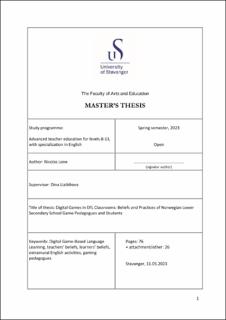| dc.description.abstract | The current thesis aimed to explore Norwegian lower secondary gaming pedagogues’ and students’ beliefs concerning the use of digital games in the EFL classroom. In addition, it aimed to investigate the reported challenges associated with digital games in the EFL classroom. Finally, this study investigated the gaming pedagogues reported practices when it comes to digital games, how they use them, and why.
To gather the data, the study employed a mixed methods research design, including gaming pedagogue interviews and a student questionnaire. Four lower secondary gaming pedagogues from four separate Norwegian lower secondary schools were interviewed to investigate gaming pedagogues’ beliefs and their reported practices concerning the use of digital games as a tool to promote EFL learning. Additionally, 101 students from the gaming pedagogues’ classes participated in a questionnaire in order to provide insight into their beliefs.
The findings demonstrated an overall positive belief concerning the use of digital games as a tool for EFL learning. Both gaming pedagogues and the students reported that digital games can be beneficial when used within the EFL classroom. While all the gaming pedagogues agreed that digital games can be a source of motivation and increased engagement, the amount of implementation and their reasoning behind it varied somewhat. Whereas some gaming pedagogues had used digital games due to their cultural relevance among students, others implemented it to reduce intimidation during communication.
Despite the generally favorable beliefs, the study also identified challenges associated with using digital games in EFL learning, as reported by both gaming pedagogues and their students. The main challenges included the time investment required to ensure quality, in addition to the elements of distraction and varying gaming proficiency, as reported by learners.
The present study contributes within the field of L2 English to gain a better understanding of gaming pedagogues’ and students’ beliefs concerning the use of digital games as an effective tool in the EFL classroom. It contributes to the growing body of the research field by exploring it from both the gaming pedagogues’ and the students’ perspectives. Further, the study aims to get insight into the reported challenges of implementing digital games in EFL instruction and compare the findings to previous research in the Norwegian context. Finally, the present study contributes by exploring what types of digital games the gaming pedagogues report that they use.
The main teaching implications proposed by the findings of the current study concern how digital games are being used in the EFL classroom and for what reason. The use of digital games can increase both the students’ engagement and motivation in and outside of the classroom, as well their ability to communicate, read, and cooperate with peers, provided that the gaming pedagogues consider criteria such as mechanical feasibility and alignment with learning objectives. The students also reported that they preferred learning through the use of digital games, compared to other instructional methods, and that they also played digital games at home. Teachers can capitalize on this by implementing digital games in their EFL instruction, while carefully considering the varying degrees of gaming experience among their learners, in order to provide a more varied and motivational classroom.
Further studies are recommended in order to expand the knowledge in this growing field. While the findings suggest an overall positive belief on use of digital games in the EFL classroom, further studies could investigate the long-term impact of digital games on language acquisition and engagement to get a better understanding of the sustainability and effectiveness of digital games as an instructional tool. | |
